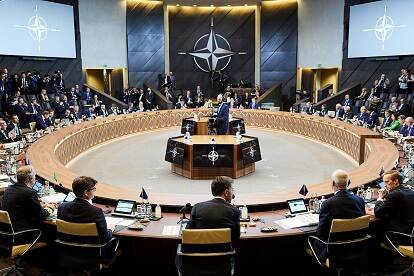Results – Evaluation of Dutch foreign and security policy towards the EU and NATO
This evaluation report examines Dutch policy on contributing manpower and resources to the security and defence efforts of the EU and NATO to protect national security. How do the Netherlands ensure that these organisations contribute to Dutch security? And what do the Netherlands do to contribute?
IOB evaluated Dutch foreign and security policy regarding NATO and the EU for the period 2020-2024. In particular, the following was researched:
- efforts to counter hybrid threats
- the strengthening of the defence industry
- contributions to military missions and readiness
Background

NATO has been the cornerstone of the military defense of Dutch territory against foreign threats for decades. In addition, in the past twenty years the EU has been playing an increasingly bigger role in the field of security and defense. The EU has therefore explicitly become an actor in Dutch security policy. In 2020 the Dutch government formalized this in a dual-track approach to NATO and the EU: it wanted to strengthen both NATO and the EU in the interest of Dutch security. The starting point is that the two organisations can also strengthen each other.
Main question
What conclusions can be drawn about the effectiveness of Dutch security policy regarding NATO, the EU and efforts to improve the coherence between NATO and the EU between 2020-2024 and what lessons can be learned for future policy?
Conclusions

Main conclusion:
During the period under review, the Netherlands’ engagement in NATO and the EU has contributed to the country’s security. The diplomatic efforts and the knowledge, manpower and resources provided by the Netherlands have strengthened NATO and the EU. However, opportunities are still being missed. During the period under review, the Netherlands lacked a clear guiding strategy to inform decision-making on its NATO and EU commitments.
The main conclusion is further elaborated in the study in the four sub-conclusions summarised here:
- The Dutch commitment to NATO and the EU contributed to the security of the Netherlands during the period under review. However, in an unstable geopolitical context, continuous effort is required to strengthen NATO and the EU in line with Dutch interests.
- During the period under review, the Dutch government did not develop a guiding strategy to shape the division of roles and responsibilities between NATO and the EU, nor to enhance their complementarity, on the basis of which our country could determine distinct priorities and commitments for each organisation.
- The Netherlands' diplomatic efforts within NATO and the EU are generally effective, but there are opportunities to exert more influence.
- The Netherlands constructively contributes knowledge, manpower and resources to strengthen EU and NATO security policy, but some opportunities are being missed.
Recommendations

Based on the findings IOB presents the following five recommendations, which are further elaborated in the report:
Contact person


